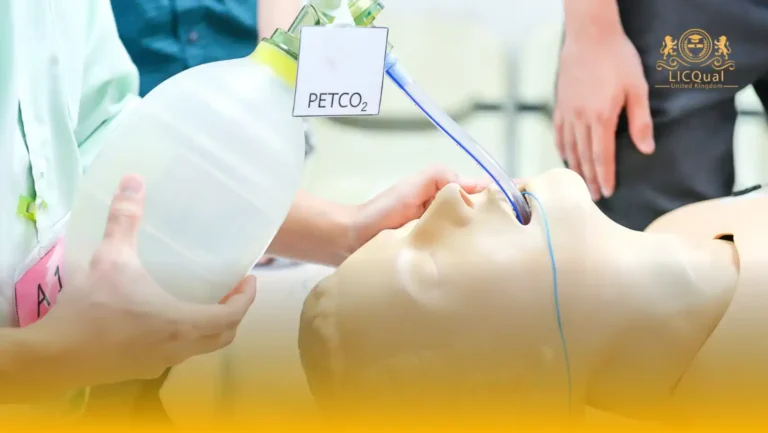The LICQual Level 3 Certificate in Family Medicine (Cert FM) is a professionally designed qualification aimed at healthcare practitioners seeking to enhance their expertise in family medicine. This course is not intended for fresh candidates but is specifically structured for learners who are already working in healthcare and wish to advance their career prospects, expand their clinical knowledge, and enhance their Continuing Professional Development (CPD).
This qualification provides learners with a comprehensive understanding of family medicine principles, including patient assessment, preventive care, disease management, and holistic approaches to patient health. Learners will gain valuable insights into primary healthcare practices, enabling them to make informed clinical decisions and provide high-quality care across diverse patient populations.
The course emphasises practical, real-world applications alongside theoretical knowledge. Learners will explore diagnosis, treatment, patient communication, and health promotion strategies, equipping them with the skills necessary to deliver effective care in a primary healthcare setting.
Centres delivering the LICQual Level 3 Certificate in Family Medicine must ensure that all teaching is conducted by competent and qualified staff, supported with appropriate learning resources and materials. Accredited centres must provide a structured learning environment that promotes learner success, engagement, and practical competency, ensuring that each learner achieves the full benefit of the qualification.
By completing this course, learners will not only strengthen their professional capabilities but also position themselves for greater responsibilities and career growth within healthcare services. This qualification is ideal for those committed to improving patient outcomes and contributing meaningfully to the field of family medicine.
Course Overview
Qualification Title
LICQual Level 3 Certificate in Family Medicine (Cert FM)
Total Units
6
Total Credits
24
GLH
120
Qualification #
LICQ2200835
Qualification Specification
To enroll in the LICQual Level 3 Certificate in Family Medicine (Cert FM), applicants must meet the following criteria:
|
Qualification# |
Unit Title |
Credits |
GLH |
|---|---|---|---|
|
LICQ2200835-1 |
Principles of Family Medicine |
4 |
20 |
|
LICQ2200835-2 |
Patient Assessment and Clinical Examination |
4 |
20 |
|
LICQ2200835-3 |
Disease Prevention and Health Promotion |
4 |
20 |
|
LICQ2200835-4 |
Diagnosis and Management of Common Conditions |
4 |
20 |
|
LICQ2200835-5 |
Communication and Patient Engagement |
4 |
20 |
|
LICQ2200835-6 |
Professional Practice and Ethics in Family Medicine |
4 |
20 |
By the end of this course, learners will be able to:
Unit 1: Principles of Family Medicine
By the end of this unit, learners will be able to:
- Explain the role and scope of family medicine within primary healthcare systems.
- Analyse patient-centred care approaches and holistic healthcare principles.
- Evaluate community health strategies and wellness promotion practices.
- Discuss the responsibilities of family medicine practitioners in improving population health.
Unit 2: Patient Assessment and Clinical Examination
By the end of this unit, learners will be able to:
- Conduct comprehensive patient assessments, including medical history and physical examination.
- Recognise common signs and symptoms of prevalent conditions in primary care.
- Apply clinical reasoning to interpret patient information and make informed decisions.
- Understand ethical considerations, patient confidentiality, and professional conduct during examinations.
Unit 3: Disease Prevention and Health Promotion
By the end of this unit, learners will be able to:
- Explain key principles of disease prevention in family medicine and primary care.
- Implement immunisation and vaccination strategies for different patient groups.
- Develop health promotion plans and lifestyle interventions for individuals and communities.
- Assess risk reduction strategies and preventive measures to improve public health outcomes.
Unit 4: Diagnosis and Management of Common Conditions
By the end of this unit, learners will be able to:
- Identify and diagnose common acute and chronic conditions in family medicine.
- Apply clinical guidelines and evidence-based protocols for patient management.
- Develop treatment plans, monitor patient progress, and manage follow-up care.
- Determine when to refer patients to specialist services for advanced care.
Unit 5: Communication and Patient Engagement
By the end of this unit, learners will be able to:
- Demonstrate effective communication skills with patients, families, and colleagues.
- Apply motivational interviewing techniques to encourage behavioural change.
- Promote patient adherence to treatment plans and self-care strategies.
- Consider cultural, social, and psychological factors that affect patient engagement.
Unit 6: Professional Practice and Ethics in Family Medicine
By the end of this unit, learners will be able to:
- Explain legal and ethical responsibilities in family medicine practice.
- Apply professional standards, clinical governance, and best practice guidelines.
- Maintain accurate patient records while adhering to confidentiality and data protection regulations.
- Engage in Continuing Professional Development (CPD) and reflective practice to enhance professional competence.
The LICQual Level 3 Certificate in Family Medicine (Cert FM) is designed for healthcare professionals, students, and practitioners who want to specialize in primary care and holistic patient management. This family medicine Level 3 certification is ideal for those seeking to enhance their clinical expertise, improve patient outcomes, and advance their careers in hospitals, clinics, and community healthcare settings. Whether you are a doctor, nurse, general practitioner, or healthcare assistant, this family medicine diploma course Level 3 provides the skills and recognition you need to stand out in the healthcare sector.
1. Medical Students and Graduates
- Builds a strong foundation in family medicine and primary care.
- Complements existing medical studies with specialized knowledge.
- Enhances academic profile with an internationally recognized qualification.
- Prepares learners for advanced family medicine training and higher-level diplomas.
- Provides practical insights into patient-centered care and community health.
2. Doctors and General Practitioners
- Expands clinical expertise in preventive and holistic care.
- Adds credibility with a recognized family medicine certification.
- Helps in offering comprehensive care across all age groups.
- Supports career progression into family medicine-focused roles.
- Strengthens professional profile for both local and international practice.
3. Nurses and Paramedics
- Equips frontline healthcare workers with essential family medicine knowledge.
- Improves patient care in hospitals, clinics, and community settings.
- Enhances confidence in managing chronic and acute conditions.
- Provides career growth opportunities in primary care and family health.
- Recognized as a valuable skill set in multidisciplinary healthcare teams.
4. Community Health Workers and Public Health Staff
- Deepens understanding of preventive medicine and health promotion.
- Strengthens ability to support families and communities.
- Enhances collaboration with doctors and nurses in primary care.
- Adds a competitive edge in public health and community roles.
- Offers international recognition for professional development.
5. Healthcare Assistants and Support Staff
- Provides essential family medicine knowledge for support roles.
- Improves ability to assist doctors, nurses, and GPs in patient care.
- Builds confidence in working with patients of all ages.
- Opens pathways to advanced healthcare and family medicine certifications.
- Enhances employability in hospitals, clinics, and community centers.
6. International Students and Healthcare Professionals
- Perfect for learners seeking a globally recognized family medicine qualification.
- Offers flexible online study options for busy professionals.
- Affordable and accessible compared to traditional medical diplomas.
- Recognized across multiple countries for career advancement.
- Builds credibility for those aiming to work abroad in family medicine.
7. Career Changers and Lifelong Learners
- Suitable for individuals transitioning into healthcare or family medicine fields.
- Provides a structured entry point into primary care studies.
- Builds confidence with step-by-step learning modules.
- Offers a professional certificate to validate new skills.
- Opens opportunities in healthcare support and allied medical services.
To deliver the LICQual Level 3 Certificate in Family Medicine effectively and maintain high-quality training standards, centres must ensure the following:
- Accredited Training Facility: Centres must hold proper accreditation to deliver Level 3 healthcare qualifications and comply with LICQual quality standards.
- Qualified and Competent Staff: Trainers should be experienced healthcare professionals with expertise in family medicine, primary care, or related health sciences.
- Comprehensive Learning Resources: Centres must provide up-to-date textbooks, journals, digital resources, and clinical guidelines relevant to family medicine and primary care.
- Practical Training Facilities: Access to clinical environments, simulation labs, and necessary medical equipment for hands-on training and patient assessment practice.
- Health and Safety Compliance: Centres must maintain strict health, safety, and infection control protocols to ensure the safety of learners and staff.
- Assessment and Evaluation Capability: Ability to conduct theoretical and practical assessments, including case studies, assignments, and clinical demonstrations, in line with LICQual standards.
- Learner Support Services: Provision of mentoring, academic guidance, and additional support to meet diverse learner needs and enhance learning outcomes.
- Technology and IT Infrastructure: Access to e-learning platforms, online research databases, and digital tools to support theoretical and practical learning components.
- Record Keeping and Reporting: Systems for accurate learner registration, progress tracking, assessment documentation, and timely certification.
- Compliance with International Standards: Centres should align training delivery with global best practices in family medicine, primary healthcare, and clinical governance.
Assessment and Verification
All units within this qualification are subject to internal assessment by the approved centre and external verification by LICQual. The qualification follows a criterion-referenced assessment approach, ensuring that learners meet all specified learning outcomes.
To achieve a ‘Pass’ in any unit, learners must provide valid, sufficient, and authentic evidence demonstrating their attainment of all learning outcomes and compliance with the prescribed assessment criteria. The Assessor is responsible for evaluating the evidence and determining whether the learner has successfully met the required standards.
Assessors must maintain a clear and comprehensive audit trail, documenting the basis for their assessment decisions to ensure transparency, consistency, and compliance with quality assurance requirements.







